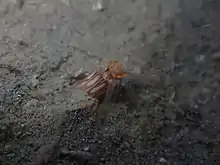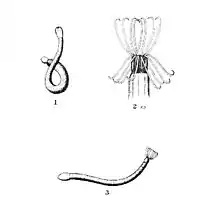Edwardsia neozelanica
Edwardsia neozelanica, commonly known as the burrowing anemone, is a small cryptic sea anemone from New Zealand. It burrows into soft mud or sand, and when covered with water extends its tentacles to feed on tiny particles of detritus.
| Edwardsia neozelanica | |
|---|---|
 | |
| Scientific classification | |
| Domain: | Eukaryota |
| Kingdom: | Animalia |
| Phylum: | Cnidaria |
| Class: | Hexacorallia |
| Order: | Actiniaria |
| Family: | Edwardsiidae |
| Genus: | Edwardsia |
| Species: | E. neozelanica |
| Binomial name | |
| Edwardsia neozelanica Farquhar, 1898 | |
| Synonyms | |
|
List
| |
Distribution and habitat
E. neozelanica is found in New Zealand, in intertidal areas such as harbour mouths or rock pools where silt and mud accumulates.[1] Being small and so similar in colour to the substrate it lives in, E. neozelanica is a cryptic species most often found when sand or mud is passed through a fine sieve.[1]
Description

This tiny anemone has a diameter of just 5 millimetres and a length of 30–50 millimetres.[2][3] Its long worm-like body is divided into three parts: physa, scapus, and capitulum. The physa is a bulbous bladder-like organ covered with tiny suckers, used in burrowing.[4] The scapus or body column is wrinkly and covered with a rough cuticle that can be brown, grey, or orange in colour, with a narrow neck at the top connecting it to the capitulum or oral end.[4]
E. neozelanica has on its capitulum sixteen or more transparent tentacles, usually in two whorls of eight, that are pinkish white to buff yellow or brown in colour.[3][4] Each tentacle in the outer whorl corresponds with one of eight brown lines that originate on the scapus as longitudinal double white lines.
Behaviour and diet
This worm-like sea anemone thrusts its body into soft mud or sand before anchoring itself in place by slightly swelling its body column.[3] Only its oral disc and tentacles are visible above the silt. It feeds on organic detritus, extending its fine tentacles across the surface of the sediment.[3]
References
- "Anemone, Burrowing". The Marine Life Database. Retrieved 2019-04-22.
- "Edwardsia neozelanica (Sea Anemones of New Zealand) · iNaturalist NZ". iNaturalist NZ. Retrieved 2019-04-22.
- Carson, Sally F.; Morris, Rod (2017). Collins field guide to the New Zealand seashore. Auckland, NZ: Collins. ISBN 9781775540106. OCLC 1012909625.
- Farquhar, H. (1898). "Preliminary Account of some New-Zealand Actiniaria". The Journal of the Linnean Society of London. 26 (171): 527–536. doi:10.1111/j.1096-3642.1898.tb00409.x – via BHL.